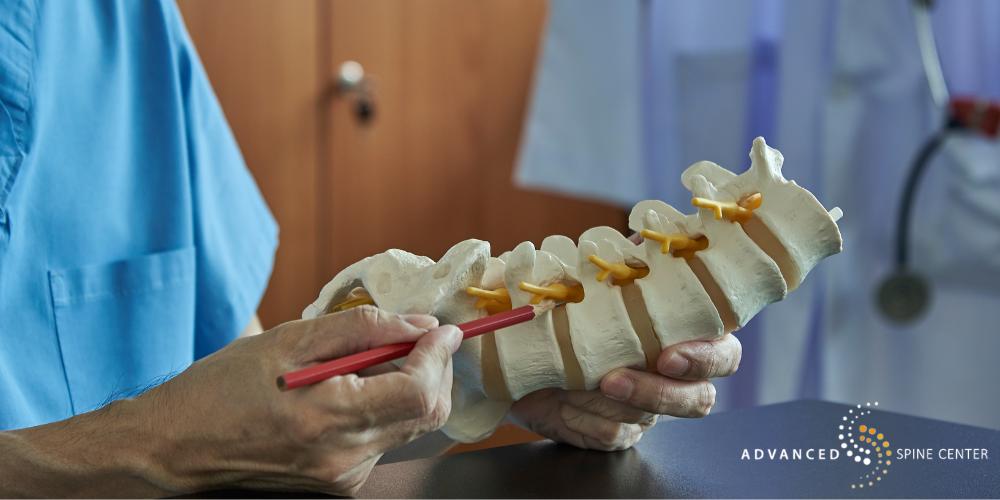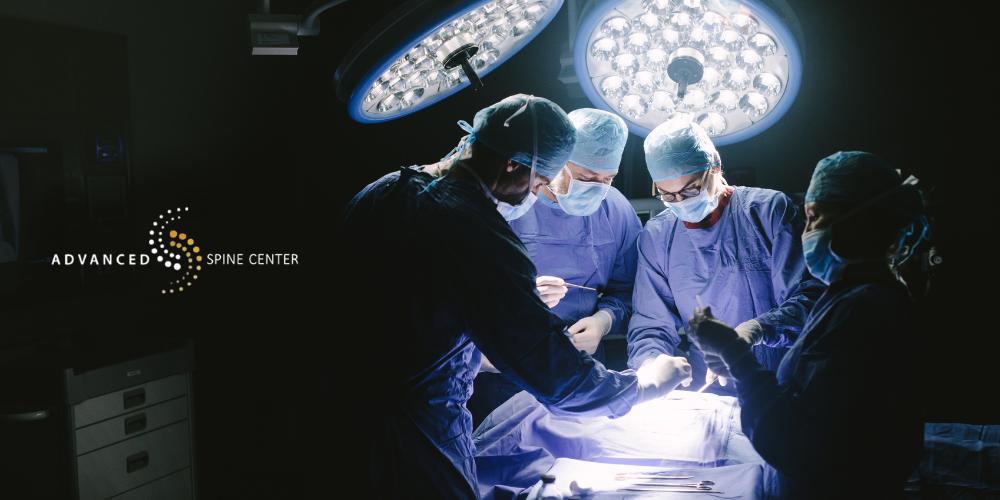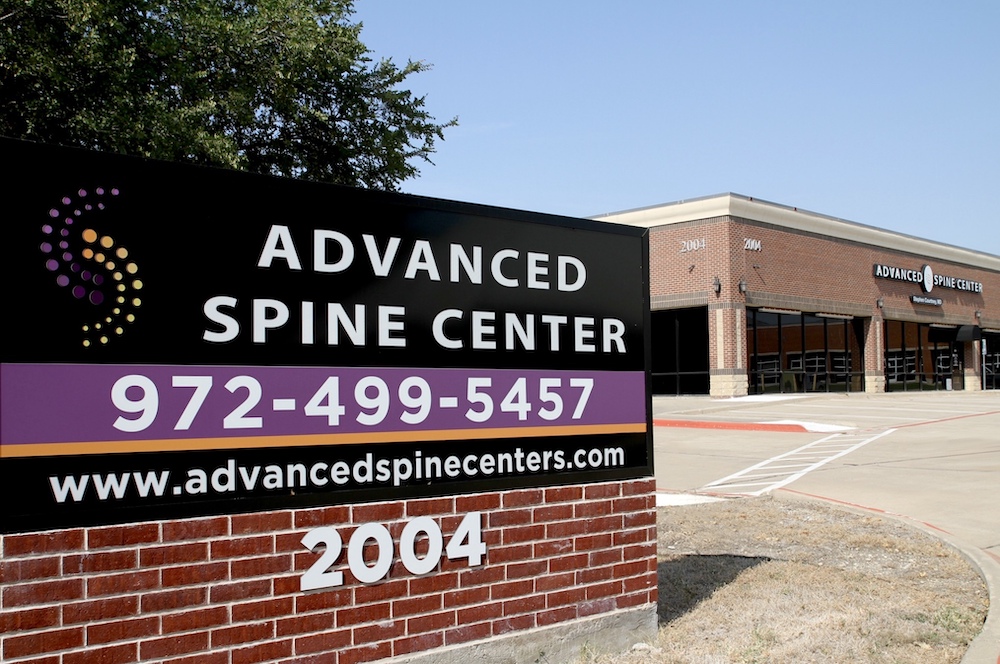Lumbar Fusion Surgery Frisco, TX
Home > Orthopedic Spine Surgeon in Frisco, TX > Lumbar Fusion Surgery Frisco, TX
Specialties
Lumbar Fusion Surgeon in Frisco, TX
According to one study from the Centers for Disease Control (CDC), nearly 40% of adults participating in the National Health Interview Survey experienced back pain in 2019. Whether that pain comes from trauma, age, or degeneration, lumbar fusion surgery may offer the relief you’ve been searching for.
If conservative treatments fail to alleviate your pain, you may want to consider a surgical approach to treatment. While we understand the hesitancy around surgery, it is a highly effective and long-lasting method of lower back pain relief. At the Advanced Spine Center, Dr. Stephen Courtney has over 20 years of experience treating patients throughout Frisco and Plano with back and neck pain. If you’re tired of living with debilitating pain, schedule an appointment with us. Call our office at 972-499-5457 today or complete our online form.
What Is Lumbar Fusion Surgery?

Lumbar fusion surgery, also known as lumbar spinal fusion, is a surgical procedure performed to stabilize the lumbar spine by fusing two or more vertebrae together. The fusion is achieved using various techniques, such as bone grafts, screws, rods, or cages, to promote the growth of new bone between the fused vertebrae. The ultimate goal of this spine surgery is to reduce pain, improve spinal stability, and prevent further movement in the affected area.
When Do We Recommend Lumbar Fusion?
Lumbar fusion surgery is typically recommended when conservative treatments, such as physical therapy, medication, and lifestyle modifications, have failed to alleviate the patient’s symptoms. Some common indications for lumbar fusion include the following.
- Degenerative disc disease: This condition occurs when the intervertebral discs between the lumbar vertebrae deteriorate, leading to pain, numbness, and weakness.
- Spinal stenosis: Lumbar spinal stenosis is the narrowing of the spinal canal, causing pressure on the spinal cord and nerves. Fusion may be necessary to relieve this pressure.
- Spondylolisthesis: When one vertebra slips forward or backward over an adjacent vertebra, it can result in instability and nerve compression. Fusion helps stabilize the affected area.
- Herniated discs: Lumbar fusion may be recommended if herniated discs compress nearby nerves, causing severe pain and neurological symptoms.
- Fractures: Traumatic fractures of the lumbar vertebrae may require fusion to stabilize the spine and promote healing.
- Tumors or infections: In cases of spinal tumors or severe infections, fusion may be necessary to remove damaged tissue and stabilize the spine.
What Symptoms Does Lumbar Spinal Fusion Surgery Treat?
Lumbar spinal fusion surgery is a versatile procedure that can effectively treat various symptoms, including the following.
- Chronic back pain: Fusion can alleviate chronic back pain that is unresponsive to conservative treatments.
- Instability: Fusion stabilizes the spine in cases of instability caused by degeneration, trauma, or deformities.
- Radiating leg pain: Sciatica, characterized by radiating leg pain due to nerve compression, can be relieved with lumbar fusion.
- Impaired quality of life: Patients with debilitating pain and limited mobility can experience a significant improvement in their quality of life following successful lumbar fusion surgery.
- Neurological symptoms: Lumbar fusion can relieve symptoms such as numbness, tingling, and muscle weakness caused by nerve compression.
What Types of Lumbar Fusion Surgeries Do We Offer?

At the Advanced Spine Center, Dr. Courtney offers lumbar spinal fusion surgery using several different techniques. Depending on the condition to be treated, the severity of the condition, and the affected area, he may employ one of the following surgical techniques.
Open Lumbar Fusion
A traditional open lumbar spine fusion approach involves a single larger incision in the lower back. This allows the surgeon to access the area to be treated. During the surgery, the surgeon will remove damaged discs or bone, insert bone grafts or artificial cages, and use screws and rods to stabilize the spine.
Anterior Lumbar Interbody Fusion
Anterior lumbar interbody fusion (ALIF) allows the surgeon to use minimally invasive techniques to access the spine via the abdomen. This anterior spinal fusion approach allows the surgeon to have better access to the front of the lumbar spine. It also minimizes the disruption to the back muscles. Once the vertebrae are fused, the surgeon may use a bone graft or surgical cage to promote growth between the spinal bones.
Posterior Lumbar Interbody Fusion
Posterior lumbar interbody fusion (PLIF) is similar to ALIF, but it approaches from the back. It allows the surgeon to remove the damaged or herniated intervertebral disc to decompress the spine and relieve pain. Once the disc material is removed, the surgeon may use a cage or bone graft to promote fusion of the spinal bones.
Posterior Spinal Fusion and Posterolateral Fusion
This technique fuses the posterior elements of the spine, such as the lamina and facet joints. It may be combined with posterolateral fusion to achieve a more comprehensive fusion of the lumbar spine.
360° Lumbar Fusion
This approach combines both anterior and posterior fusion techniques to provide maximum stability. It is often recommended for complex cases where extensive fusion is required.
How Do I Prepare for Lumbar Spinal Fusion?
Preparing for spinal fusion surgeries involves several important steps to ensure a successful procedure and recovery. Before your surgery, we recommend taking the following steps.
- Consultation: Schedule a thorough consultation with your spine surgeon to discuss your medical history, current symptoms, and surgical options.
- Medical evaluation: Undergo a comprehensive medical evaluation, which may include imaging tests like X-rays, CT scans, or MRI scans to assess the condition of your spine.
- Medication review: Inform your healthcare provider about all medications you are currently taking, including prescription drugs, over-the-counter medications, and supplements, as they may need to be adjusted before surgery.
- Smoking cessation: If you smoke, it’s crucial to quit before surgery, as smoking can hinder the fusion process and increase the risk of complications.
- Nutrition: Maintain a balanced diet to support your body’s healing process. Adequate nutrition is essential for bone growth and overall recovery.
- Planning for recovery: Arrange for help at home during the initial stages of recovery, as you may have mobility restrictions.
- Understanding risks and benefits: Have a detailed discussion with your surgeon about the potential risks and benefits of the surgery, including the expected outcomes and any alternative treatments.
What Can I Expect from Lumbar Spine Fusion Surgery?

After Dr. Courtney has discussed your medical history, medications, and emergency contacts, you will meet with your anesthesiologist. They will discuss your surgery and inform you of important anesthesia information. After meeting with your surgeon and anesthesia team, they will confirm that you signed your consent form before marking the surgery site.
Depending on the specific approach your surgeon takes, the exact steps of the lumbar spinal fusion can vary. For example, an open surgery would have different steps from a transforaminal lumbar interbody fusion.
Once the surgery site is marked and everyone is prepared, the anesthesiologist will place you under general anesthesia. This ensures you are not conscious and feel no pain during the procedure.
The surgeon then proceeds with the procedure according to the surgical approach they have chosen. Once they begin the fusion part of the process, they decide between an implant or bone graft, depending on the patient’s condition. They place the bone graft material between each vertebrae to be fused. This encourages fusion and bone growth.
Sometimes, a surgeon may opt to use hardware like cages, screws, or rods to further stabilize the vertebrae during fusion and the healing process. The fusion process occurs over several months.
What Can I Expect from Recovery After Lumbar Spinal Fusion Surgery?
Recovery after lumbar spinal fusions is a carefully managed process that involves several stages. Here is a general overview of what to expect.
- Hospital stay: You will typically spend a few days in the hospital for monitoring and pain management.
- Pain management: Pain medication will be prescribed to help manage postoperative discomfort.
- Mobility: You will be encouraged to start moving as soon as possible to prevent complications like blood clots and muscle atrophy.
- Brace or support: In some cases, you may need to wear a brace or support to stabilize the spine during the initial healing period.
- Physical therapy: A physical therapist will work with you to improve strength, flexibility, and mobility. Therapy may start in the hospital and continue after discharge.
- Home care: You may need assistance with daily activities at home during the early stages of recovery.
- Gradual return to normal activities: As you progress, you will gradually return to your normal activities, following your surgeon’s guidance.
How Long Does Recovery Last After Lumbar Spinal Fusion?
The duration of recovery after lumbar spinal fusion surgery can vary depending on several factors, including the type of surgery, the extent of the fusion, and individual patient factors. Generally, the recovery timeline is as follows.
Immediate Postoperative Period (Days to Weeks): During this period, you will focus on pain management, wound care, and regaining basic mobility.
Early Rehabilitation (Weeks to Months): Physical therapy becomes a central part of your recovery as you work on improving strength, flexibility, and mobility.
Intermediate Phase (Months): You will continue progressing in your rehabilitation, gradually returning to more demanding activities.
Long-Term Recovery (Months to a Year or More): Full recovery from lumbar fusion can take several months to a year or more. Your surgeon will monitor your progress during follow-up appointments.
What Is the Success Rate of Lumbar Spinal Fusion?
The success of lumbar spinal fusion surgery can vary depending on the underlying condition, the type of surgery performed, and individual patient factors. Overall, the success rate of lumbar fusion is high for patients who are carefully selected and follow their postoperative rehabilitation plan. Success is typically defined as a significant reduction in pain, improved spinal stability, and the successful fusion of the vertebrae.
It’s important to note that success may not always mean complete pain relief, and some patients may experience residual symptoms. Additionally, outcomes can be influenced by factors such as the patient’s overall health, age, and compliance with postoperative instructions.
Restrictions After Lumbar Spinal Fusion Surgery

After lumbar spinal fusion surgery, there are certain restrictions and guidelines you should follow to promote a successful recovery and minimize the risk of complications. These restrictions may include the following.
- Avoid heavy lifting
- No high-impact activities
- Avoid poor posture and body mechanics
- Stop smoking
- Don’t push yourself too soon
- Don’t skip physical therapy
- Avoid unhealthy foods
What Are the Potential Risks and Complications of Lumbar Fusion?
As with any surgical procedure, lumbar fusion surgery has potential risks and complications. While most patients experience successful outcomes, it’s important to be aware of the following risks.
- Infection: Infection at the surgical site is a potential complication, which may require additional treatment, including antibiotics or drainage.
- Blood clots: Deep vein thrombosis (DVT) and pulmonary embolism (PE) are blood clot-related complications that can occur after surgery. Compression stockings and blood thinners may be used to reduce the risk.
- Nerve damage: During surgery, there is a slight risk of damage to spinal nerves, which can result in new or worsening neurological symptoms.
- Pseudoarthrosis: In some cases, the fused vertebrae may not completely heal, leading to a condition called pseudoarthrosis. Additional surgery may be required to address poor bone healing.
- Hardware complications: Screws, rods, or cages used for fusion may become loose, break, or migrate, requiring lumbar revision surgery.
- Adjacent segment disease: Fusion can alter the biomechanics of the spine, potentially increasing stress on adjacent vertebrae and leading to degeneration in those segments.
- Chronic pain: While the goal of fusion is to relieve pain, some patients may experience chronic pain or discomfort after surgery.
- Anesthesia complications: Allergic reactions to anesthesia or complications related to general anesthesia can occur.
- Bleeding: Excessive bleeding during surgery can occur from damaged blood vessels.
- Scar tissue formation: The development of excessive scar tissue (epidural fibrosis) around the surgical site may cause pain and discomfort.
It’s crucial to discuss these potential risks and complications with your surgeon before proceeding with lumbar fusion surgery. Additionally, selecting an experienced and skilled surgeon can help minimize the risk of adverse outcomes.
Contact a Frisco Lumbar Fusion Specialist at the Advanced Spine Center Today
Lumbar fusion surgery is a valuable treatment option for individuals suffering from a range of spinal conditions causing pain, instability, and neurological symptoms. At the Advanced Spine Center, Dr. Courtney offers a wide array of minimally invasive techniques aimed at reducing pain and treating debilitating spinal conditions. He offers not only lumbar spinal fusion, but also cervical spinal fusion for patients in the Frisco and Plano areas.
If you struggle with lower back pain, whether from trauma, wear-and-tear, or a spinal condition, you can trust Dr. Courtney to provide high-quality, compassionate care. When you need the best healthcare for your lumbar spine problems, contact the Advanced Spine Center. Call our office at 972-499-5457 or fill out our online intake form.

Request an Appointment
Common Patient Questions
ExcellentBased on 147 reviews
 Robert AliceaThe doctor and his staff were very welcoming and kind ..explained my issues in detail . Will highly recommend
Robert AliceaThe doctor and his staff were very welcoming and kind ..explained my issues in detail . Will highly recommend German CisnerosEvery visit to Dr. Courtney's office is educational and most beneficial. Dr. Courtney and ALL of his staff are the best!
German CisnerosEvery visit to Dr. Courtney's office is educational and most beneficial. Dr. Courtney and ALL of his staff are the best! Jamey DerryberryMy wife and I both go to Dr Courtney for back issues. Great care. Great staff. Great surgical facility and smooth process. LOVE THEM!!!
Jamey DerryberryMy wife and I both go to Dr Courtney for back issues. Great care. Great staff. Great surgical facility and smooth process. LOVE THEM!!! Mark CotterDr Courtney and his staff truly care about my well being. They are the only ones I have found that have been able to help me with my workman's comp claim
Mark CotterDr Courtney and his staff truly care about my well being. They are the only ones I have found that have been able to help me with my workman's comp claim J “JAFO”Does your back hurt? Has your back been hurting, yet no other surgeon can or won't help you; or worse tells you nothing is wrong? You're in the wrong place! I had 4 back operations with no improvement. I had an additional 6 other consultations with "there's nothing wrong with you". The truth was I was probably 2-3 months away from permanent leg and lower back paralysis. He fixed me. I can stand, I can walk. I threw away my crutches of 13 years. If you need back correction - GO SEE THIS DOCTOR! He will fix you, and fix you correctly, if it is humanly possible. Enough said! Go see him. He tells the truth and tells it like it is. 🙂
J “JAFO”Does your back hurt? Has your back been hurting, yet no other surgeon can or won't help you; or worse tells you nothing is wrong? You're in the wrong place! I had 4 back operations with no improvement. I had an additional 6 other consultations with "there's nothing wrong with you". The truth was I was probably 2-3 months away from permanent leg and lower back paralysis. He fixed me. I can stand, I can walk. I threw away my crutches of 13 years. If you need back correction - GO SEE THIS DOCTOR! He will fix you, and fix you correctly, if it is humanly possible. Enough said! Go see him. He tells the truth and tells it like it is. 🙂 Terri StewmanDr courtney and his staff are great! Dr courtney always takes his time with you and I feel he truly cares about his patients.
Terri StewmanDr courtney and his staff are great! Dr courtney always takes his time with you and I feel he truly cares about his patients. Ross WigingtonGreat Dr and helped me multiple times over the years Would recommend to anyone that needs help
Ross WigingtonGreat Dr and helped me multiple times over the years Would recommend to anyone that needs help Bridgette e MentesanaDr. Courtney is knowledgeable and takes the time to really explain what’s going on and explain why you’re in pain and the several options to correct the issue. I never felt rushed and he was on time to our appointment which is such a rare thing. The rest of the office staff was absolutely top notch. They were really down to earth and so nice, you could tell they liked their jobs and were treated well. It was a very welcoming atmosphere. I felt very comfortable and I knew I was in capable hands just by the way he treated his staff and listened to his patients. Highly recommend.
Bridgette e MentesanaDr. Courtney is knowledgeable and takes the time to really explain what’s going on and explain why you’re in pain and the several options to correct the issue. I never felt rushed and he was on time to our appointment which is such a rare thing. The rest of the office staff was absolutely top notch. They were really down to earth and so nice, you could tell they liked their jobs and were treated well. It was a very welcoming atmosphere. I felt very comfortable and I knew I was in capable hands just by the way he treated his staff and listened to his patients. Highly recommend. Marie BentonDr Courtney did my neck surgery and my 360 back surgery. I would not go to another surgeon, he cares about his patients and it shows! His staff is great as well! I trust his opinion and skills 100%
Marie BentonDr Courtney did my neck surgery and my 360 back surgery. I would not go to another surgeon, he cares about his patients and it shows! His staff is great as well! I trust his opinion and skills 100%

